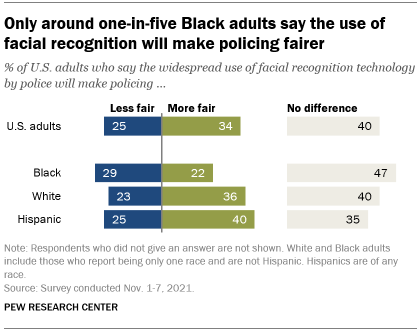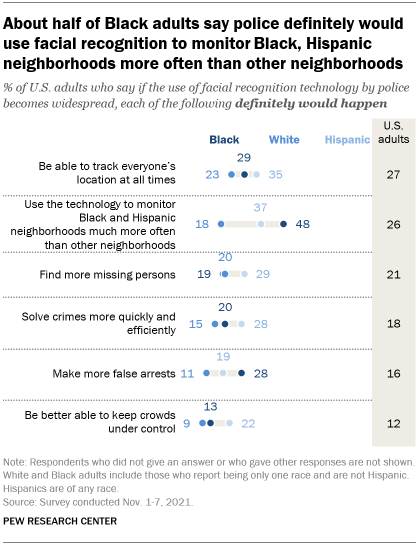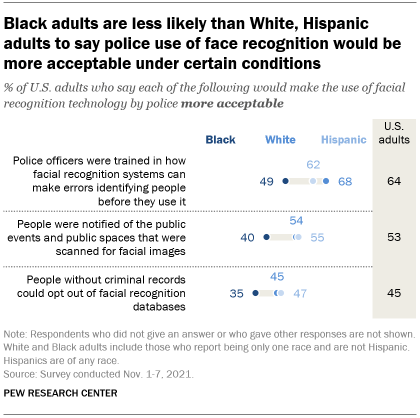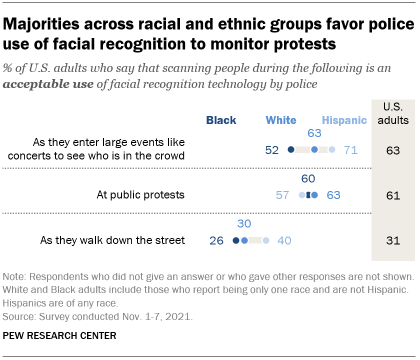Black Americans are broadly critical of several key aspects of policing and the criminal justice system in the United States. But their views on an emerging tool in U.S. law enforcement – the use of face recognition technology – are more nuanced, according to a recent Pew Research Center survey of U.S. adults, conducted in November 2021. In some cases, Black Americans stand out for their skepticism around the use of such technology by police, but in other cases, their views are largely in line with other racial and ethnic groups analyzed in this survey.
Here are the key findings about Black Americans’ views toward the use of this technology by police, based on the Center’s November 2021 survey. The findings come as other studies have found that face recognition technology may be accurate for identifying White men but is less accurate when it comes to identifying others.
Pew Research Center has a history of studying Americans views of face recognition and policing. This study is part of a larger body of work addressing Americans’ views about artificial intelligence and human enhancement technologies. For this analysis, we surveyed 10,260 U.S. adults from Nov. 1 to 7, 2021.
Everyone who took part in the survey is a member of the Center’s American Trends Panel (ATP), an online survey panel that is recruited through national, random sampling of residential addresses. This way, nearly all U.S. adults have a chance of selection. The survey is weighted to be representative of the U.S. adult population by gender, race, ethnicity, partisan affiliation, education and other categories. Read more about the ATP’s methodology.
Here are the questions used for this report, along with responses, and its methodology.

Black Americans are less likely than White or Hispanic Americans to believe that the widespread use of facial recognition technology will make policing fairer. Only 22% of Black adults say it will make policing fairer, while 29% say it will make policing less fair and about half say it will make no difference. Hispanic and White Americans are more likely than Black Americans to say the widespread use of this technology will make policing fairer (40% and 36% say this, respectively).
Like Americans overall, most Black Americans are skeptical about whether face recognition technology should be used as evidence to arrest people. A majority of Americans, including 74% of Black adults, say that if a facial recognition program said that someone was involved in a crime, it should not be good enough evidence for police to arrest them. Roughly a third or fewer of adults in each major racial or ethnic group say the technology should be good enough evidence, even if there was a small chance the program was wrong.

Black Americans are more likely than other Americans to see certain negative outcomes from the widespread use of face recognition technology by police. For example, nearly half of Black adults (48%) think police definitely would use facial recognition technology to monitor Black and Hispanic neighborhoods much more often than other neighborhoods. That is higher than the shares of Hispanic (37%) and White (18%) adults who say the same.
Similarly, Black adults are more likely than people of other races and ethnicities to think police would make more false arrests if the use of facial recognition technology became widespread. Some 28% of Black adults say they think this would definitely happen, compared with 19% of Hispanics and 11% of White adults.

Black Americans are more skeptical than White or Hispanic Americans about whether certain measures might make the use of face recognition technology by police more acceptable. Black adults are less likely than Hispanic and White adults to think each of three separate measures asked about in the survey would make face recognition technology use by police more acceptable. For example, only around a third of Black adults (35%) say that allowing people without criminal records to opt out of facial recognition databases would make the use of this technology more acceptable. Hispanic and White adults are more likely to say this (47% and 45%, respectively).

Most Black adults say scanning people at public protests is an acceptable use of facial recognition technology by police. Six-in-ten Black adults say this, as do similar shares of White and Hispanic adults (63% and 57%, respectively). Black Americans, however, are less likely to see the other two uses of the technology as acceptable: Only around half (52%) say it would be acceptable to scan people as they enter large events like concerts to see who is in the crowd, and only around a quarter (26%) say it would be acceptable for police to scan people as they walk down the street.
A plurality of Americans say the widespread use of facial recognition technology by police would be a good idea for society, but the same cannot be said for Black Americans. Among Americans overall, 46% of U.S. adults say the widespread use of such technology by police would be a good idea for society, 27% say it would be a bad idea and 27% aren’t sure. But when it comes to Black adults’ views, no consensus emerges: Four-in-ten Black adults say the widespread use of facial recognition technology would be a good idea for society, while three-in-ten say it would be a bad idea and another three-in-ten aren’t sure.
Note: Here are the questions used for this report, along with responses, and its methodology.
